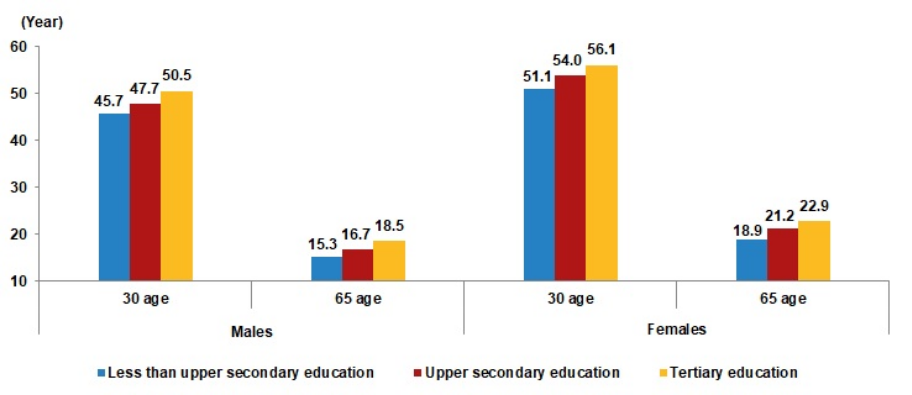Life expectancy in Türkiye declines slightly to 77.3 years
 People are walking in Istanbul, Türkiye. (AA Photo)
People are walking in Istanbul, Türkiye. (AA Photo)
Life expectancy at birth in Türkiye fell slightly to 77.3 years in the 2021-23 period, down from 77.5 years in 2020-22, according to the latest life tables published by the Turkish Statistical Institute (TurkStat).
For the first time, life expectancy by attained education level was also calculated, revealing a clear correlation between higher education and increased life expectancy.
Life expectancy by gender: Females live longer in Türkiye
The data shows that females in Türkiye continue to outlive males by an average of 5.3 years. In the 2021-23 period, life expectancy for males decreased slightly from 74.8 to 74.7 years, while for females it declined from 80.3 to 80 years.

Life expectancy at key ages
For those aged 15, the average remaining life expectancy is 63.5 years – 60.9 years for males and 66.1 years for females. At age 30, the average life expectancy drops to 49.1 years, with males expected to live 46.6 more years and females 51.5 years.
At age 50, individuals in Türkiye can expect to live an additional 30.1 years, with males having a life expectancy of 27.8 years and females 32.3 years. At age 65, the life expectancy stands at 17.4 years – 15.7 years for males and 19 years for females, indicating that females live 3.3 years longer on average than males at this age.
Regional differences: Tunceli tops life expectancy
Tunceli had the highest life expectancy at birth in Türkiye, with an average of 80.8 years. This province was followed by Sırnak and Mardin with 79.7 years. Kilis had the lowest life expectancy at 76.1 years, followed by Gaziantep (76.2) and Adana (76.8).
For males, Tunceli also had the highest life expectancy at 78.1 years, while Kilis ranked the lowest at 73.2 years. For females, Tunceli recorded the highest life expectancy at 83.6 years, while Gaziantep had the lowest at 78.7 years.

Major cities: Life expectancy in Istanbul, Ankara
In Istanbul, the country’s largest city, life expectancy at birth was 78.6 years, with 75.8 years for males and 81.3 years for females. In the capital, Ankara, life expectancy was higher than the national average at 79.2 years, with males living 76.5 years and females 81.8 years.

Impact of education on life expectancy
For the first time, life expectancy was calculated based on education levels, and the data revealed a positive correlation between education and life expectancy.

Individuals with tertiary education were found to live longer than those with lower educational attainment. The difference in life expectancy at age 30 between those with less than upper secondary education and those with tertiary education was around five years.



